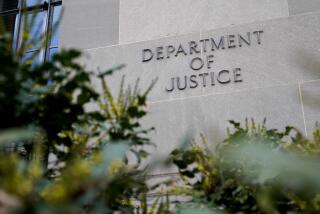Fighting Fraudulent Health Care Charges
Now showing in theater No. 1: âThe Prince of Egypt.â Now showing in theater No. 2: Medicare Fraud Fighterâs Rally!
About 100 seniors gathered at a movie theater in Lakewood on Wednesday to learn how to track down perpetrators of Medicare fraud. Similar meetings were held in 29 other locations across the country, coordinated by the U.S. Department of Health and Human Services, the Justice Department and the American Assn. of Retired Persons, to kick off a new national education campaign to combat health fraud.
Its goal: educating millions of Medicare recipients in the art of deciphering their billing statements to spot potentially bogus charges for services not rendered or needed. The government has estimated that roughly 7% of all billings submitted by doctors, hospitals, medical equipment suppliers and others for the nationâs 39 million Medicare beneficiaries are fraudulent.
*
Inside the theater, a gentle sea of seniors sat attentively, some busily taking notes as they watched a news conference--live from Washington via satellite--with Health and Human Services Secretary Donna Shalala, Atty. Gen. Janet Reno and other officials. Next came talks from local Medicare fraud experts from the AARP, FBI, U.S. Attorneyâs office and others.
Here, they were told, is how to help fight Medicare fraud.
First, read your Medicare statements--which arenât bills, just statements of charges to the government on your behalf--as soon as they arrive.
If something appears fishy, immediately write down the facts as you recall them.
If your memory of events doesnât match the statement, donât just assume youâve found fraud. Most health care providers are honest. You might be mistaken. Or there could be an unintentional error.
Instead, call your doctorâs office for clarification. If you donât get a satisfactory explanation, call the medical insurer listed on your statement and ask for clarification.
If you still have suspicions, call the Medicare Fraud Hotline at (800) 447-8477 and report your concerns. Be sure to provide dates of the incident, your Medicare number and the name of the service provider youâre questioning.
If your report leads to recovery of Medicare funds, you may be entitled to a reward. But even without such incentives, seniors, say surveys, are willing to help.
Evelyn Suskin, 71, a resident of the Leisure World retirement community in Laguna Hills, lent a hand in Uncle Samâs fight against fraud in 1995, when she discovered a medical supply company was fraudulently billing for medical equipment for her husband, now deceased. She turned the company in, and the government recovered $12,000.
âIt just made me very angry to feel that somebody was perpetrating fraud,â she said. âThis is our money.â
But how easy is it to decipher these statements? These are, after all, bureaucratic forms--murky almost by definition.
It may be easy in some cases, says Lori Richardson Pelliccioni, a Los Angeles health care consultant and former federal prosecutor in health fraud cases. Take a piece of medical equipment, such as a wheelchair. Either you got it or you didnât.
But how will patients know if they received what in Medicare jargon is known as a level one, two, three or other type of doctorâs visit, each with its own numbered code? âItâs a tall order,â she says. âEven we who work in the business have to look up those codes.â
*
Some doctors fear that the campaign will put up walls between patients and their doctors.
âI believe this is really stepping overboard,â says Dr. Ted Mazer, a San Diego otolaryngologist and chairman for the committee on medical services for the California Medical Assn. â âYou can turn your doctor in and get a piece of the actionâ--thatâs basically what it amounts to.â
Thus, itâs worth repeating, as did Wednesdayâs panelists: Most health care providers are honest. Donât always assume the worst.
By midday, the crowd had dispersed, Medicare fraud-busting kits in their hands: a plastic bag stuffed with a booklet, magnifying glass, note pad, AARP Fraud Fighter badges and refrigerator magnets--all that a private eye could wish for.
Some of the seniors, at least, left with the kind of resolve the rallyâs organizers had hoped for. In the theater foyer, Marie of Long Beach (who didnât want to give her last name) was loading up with Medicare fraud posters to display at her senior center. Don McCartney of Long Beach and Sidney Streetman of Lakewood said they were fired up to do their part. âWeâre going to spread the word,â they said.
More to Read
Sign up for Essential California
The most important California stories and recommendations in your inbox every morning.
You may occasionally receive promotional content from the Los Angeles Times.










